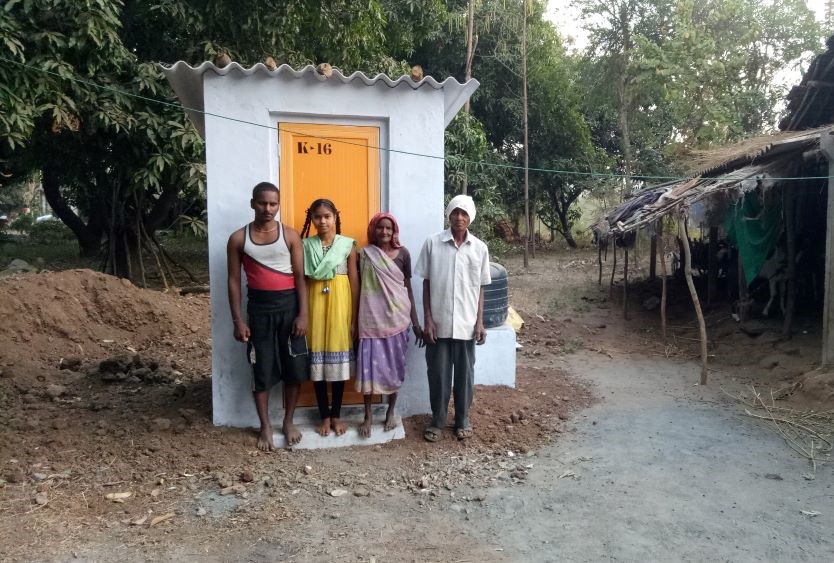Ramilaben Nayaka, a domestic worker, lives with her aged mother-in-law, husband and two adolescent children in Anjlav, a remote tribal village of Valsad district in Gujarat. Her daughter Urvashi used to choose dark hours in the early morning or late evenings to relieve herself on the outskirts of the village. The anxiety of being seen by someone made her choose these odd hours. Their economic condition did not allow them to buil d a toilet for the family. Atul Foundation had built a toilet for them in their backyard. “I need not worry about my aged mother and adolescent daughter now, especially during the monsoon,” shares Ramilaben.
d a toilet for the family. Atul Foundation had built a toilet for them in their backyard. “I need not worry about my aged mother and adolescent daughter now, especially during the monsoon,” shares Ramilaben.
This is not an isolated story of any particular family from a tribal village of South Gujarat. Many people residing in the tribal villages still use open fields and riverbanks to relieve themselves.
Open defecation is a challenge for rural India that perpetuates the vicious cycle of disease and poverty and is an affront to personal dignity. Besides severe health issues, it is a serious safety concern for the women of rural India. There is fear of animal and reptile bites. Crimes against women are also common when they come out in the dark in the fields to relieve themselves.
Atul Foundation has been working consistently to provide such rural families with access to toilets near their residences. With such toilet facilities, the Foundation provides the underprivileged sections of the society to facilitate their basic human rights that will ensure safety, security and dignity.
The Foundation has built about 5,500 toilets in 38 villages providing safe sanitation spaces to about 27,500 people. These toilets are fitted with water tanks and septic tanks. The families had also contributed to the construction of these toilets by providing labour, which further strengthened their ownership and responsibility of maintaining these spaces. Toilets were also customised to better suit the needs of specially-abled villagers.
Further, some families had individual toilets that were not being used as they needed repair and maintenance. In 2021, Atul Foundation joined hands with District Rural Development Agency, Valsad and retrofitted 211 toilets, thus reaching out to more than 1,000 people.

Besides household toilets, Atul Foundation has also built toilets for students in school premises. It undertook construction and renovation of toilet blocks in 13 schools to provide decent sanitation facilities to about 5,000 children every year.
The Foundation has also started constructing toilet blocks for community use. It constructed a toilet in the Nayakwad area of Atul village that provides safe sanitation facilities to around 350 people every day.
After completing construction work and making such facilities operational, the organisation does also conduct surveys to find the actual usage of the toilet facilities and understand their impact on the community.
The Foundation, established in 2010, works in the areas of Education, Empowerment, Health, Relief, Infrastructure, and Conservation. It predominantly works in in seven Indian states including Gujarat, Maharashtra, Rajasthan, and West Bengal and gradually widening its coverage to other parts of India. The Foundation has touched lives in around 1,500 villages from 22 districts through various projects and initiatives.





 d a toilet for the family. Atul Foundation had built a toilet for them in their backyard. “I need not worry about my aged mother and adolescent daughter now, especially during the monsoon,” shares Ramilaben.
d a toilet for the family. Atul Foundation had built a toilet for them in their backyard. “I need not worry about my aged mother and adolescent daughter now, especially during the monsoon,” shares Ramilaben.



.jpg)



